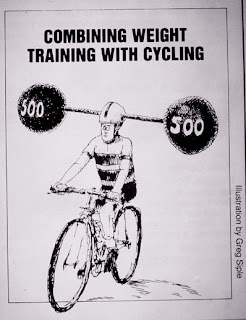
In the next two months, the road cyclists will head to the gym to begin their off-season resistance training in earnest.
From my point of view, for the majority of cyclists, the value in resistance training is to hold your body together so you can ride your bike most efficiently (transfer power in the saddle and out) and combat the postural and overuse / muscle imbalances (general wear and tear) that long term riding and training can bring on.
It can also be good cross training to get your ass out of the saddle, when you need some active rest. And don’t forget the general lean body mass and bone density benefits. By learning to resistance train appropriately, one develops lifetime physical competencies that benefit your general musculoskeletal health and function as you age.
There might be some women who could benefit from some increased general strength, particularly upper body. There may be some men or women who lack the torso stability to efficiently transfer power to the pedals. But to determine this, we need to evaluate that individual’s weaknesses off and on the bike and see what’s going on. We should never just blindly apply a stock resistance training program; first evaluate the athlete! Does s/he really have some deficits that might be addressed with off the bike training? This type of evaluation is RARELY available to cyclists who want to resistance train in the off- season. And every fall, an army of well-intentioned cyclists line up for the leg extension machine with their basic program from a book or pay big bucks to hop on the PowerPlate and have no idea how what they are doing relates to their on-bike performance.
So what are you waiting for? Give me a shout and let’s figure out what your needs are, so you can stop wasting time in the gym and start doing something beneficial for yourself—on the bike and for your health.
 In the next two months, the road cyclists will head to the gym to begin their off-season resistance training in earnest. From my point of view, for the majority of cyclists, the value in resistance training is to hold your body together so you can ride your bike most efficiently (transfer power in the saddle and out) and combat the postural and overuse / muscle imbalances (general wear and tear) that long term riding and training can bring on.
In the next two months, the road cyclists will head to the gym to begin their off-season resistance training in earnest. From my point of view, for the majority of cyclists, the value in resistance training is to hold your body together so you can ride your bike most efficiently (transfer power in the saddle and out) and combat the postural and overuse / muscle imbalances (general wear and tear) that long term riding and training can bring on. 
Comments